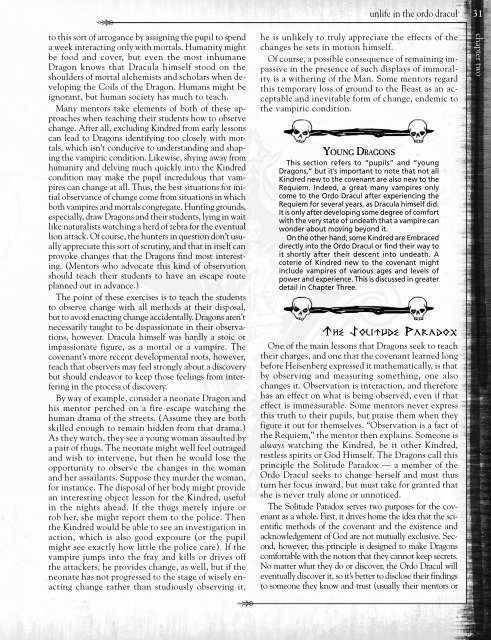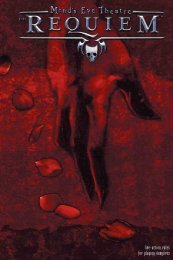Create successful ePaper yourself
Turn your PDF publications into a flip-book with our unique Google optimized e-Paper software.
to this sort of arrogance by assigning the pupil to spend<br />
a week interacting only with mortals. Humanity might<br />
be food and cover, but even the most inhumane<br />
Dragon knows that Dracula himself stood on the<br />
shoulders of mortal alchemists and scholars when developing<br />
the Coils of the Dragon. Humans might be<br />
ignorant, but human society has much to teach.<br />
Many mentors take elements of both of these approaches<br />
when teaching their students how to observe<br />
change. After all, excluding Kindred from early lessons<br />
can lead to Dragons identifying too closely with mortals,<br />
which isn’t conducive to understanding and shaping<br />
the vampiric condition. Likewise, shying away from<br />
humanity and delving much quickly into the Kindred<br />
condition may make the pupil incredulous that vampires<br />
can change at all. Thus, the best situations for initial<br />
observance of change come from situations in which<br />
both vampires and mortals congregate. Hunting grounds,<br />
especially, draw Dragons and their students, lying in wait<br />
like naturalists watching a herd of zebra for the eventual<br />
lion attack. Of course, the hunters in question don’t usually<br />
appreciate this sort of scrutiny, and that in itself can<br />
provoke changes that the Dragons find most interesting.<br />
(Mentors who advocate this kind of observation<br />
should teach their students to have an escape route<br />
planned out in advance.)<br />
The point of these exercises is to teach the students<br />
to observe change with all methods at their disposal,<br />
but to avoid enacting change accidentally. Dragons aren’t<br />
necessarily taught to be dispassionate in their observations,<br />
however. Dracula himself was hardly a stoic or<br />
impassionate figure, as a mortal or a vampire. The<br />
covenant’s more recent developmental roots, however,<br />
teach that observers may feel strongly about a discovery<br />
but should endeavor to keep those feelings from interfering<br />
in the process of discovery.<br />
By way of example, consider a neonate Dragon and<br />
his mentor perched on a fire escape watching the<br />
human drama of the streets. (Assume they are both<br />
skilled enough to remain hidden from that drama.)<br />
As they watch, they see a young woman assaulted by<br />
a pair of thugs. The neonate might well feel outraged<br />
and wish to intervene, but then he would lose the<br />
opportunity to observe the changes in the woman<br />
and her assailants. Suppose they murder the woman,<br />
for instance. The disposal of her body might provide<br />
an interesting object lesson for the Kindred, useful<br />
in the nights ahead. If the thugs merely injure or<br />
rob her, she might report them to the police. Then<br />
the Kindred would be able to see an investigation in<br />
action, which is also good exposure (or the pupil<br />
might see exactly how little the police care). If the<br />
vampire jumps into the fray and kills or drives off<br />
the attackers, he provides change, as well, but if the<br />
neonate has not progressed to the stage of wisely enacting<br />
change rather than studiously observing it,<br />
unlife in the ordo dracul<br />
he is unlikely to truly appreciate the effects of the<br />
changes he sets in motion himself.<br />
Of course, a possible consequence of remaining impassive<br />
in the presence of such displays of immorality<br />
is a withering of the Man. Some mentors regard<br />
this temporary loss of ground to the Beast as an acceptable<br />
and inevitable form of change, endemic to<br />
the vampiric condition.<br />
YOUNG DRAGONS<br />
This section refers to “pupils” and “young<br />
Dragons,” but it’s important to note that not all<br />
Kindred new to the covenant are also new to the<br />
Requiem. Indeed, a great many vampires only<br />
come to the Ordo Dracul after experiencing the<br />
Requiem for several years, as Dracula himself did.<br />
It is only after developing some degree of comfort<br />
with the very state of undeath that a vampire can<br />
wonder about moving beyond it.<br />
On the other hand, some Kindred are Embraced<br />
directly into the Ordo Dracul or find their way to<br />
it shortly after their descent into undeath. A<br />
coterie of Kindred new to the covenant might<br />
include vampires of various ages and levels of<br />
power and experience. This is discussed in greater<br />
detail in Chapter Three.<br />
✻✯✬✂✺✶✳✰✻✼✫✬✂✷★✹★✫✶✿<br />
One of the main lessons that Dragons seek to teach<br />
their charges, and one that the covenant learned long<br />
before Heisenberg expressed it mathematically, is that<br />
by observing and measuring something, one also<br />
changes it. Observation is interaction, and therefore<br />
has an effect on what is being observed, even if that<br />
effect is immeasurable. Some mentors never express<br />
this truth to their pupils, but praise them when they<br />
figure it out for themselves. “Observation is a fact of<br />
the Requiem,” the mentor then explains. Someone is<br />
always watching the Kindred, be it other Kindred,<br />
restless spirits or God Himself. The Dragons call this<br />
principle the Solitude Paradox — a member of the<br />
Ordo Dracul seeks to change herself and must thus<br />
turn her focus inward, but must take for granted that<br />
she is never truly alone or unnoticed.<br />
The Solitude Paradox serves two purposes for the covenant<br />
as a whole. First, it drives home the idea that the scientific<br />
methods of the covenant and the existence and<br />
acknowledgement of God are not mutually exclusive. Second,<br />
however, this principle is designed to make Dragons<br />
comfortable with the notion that they cannot keep secrets.<br />
No matter what they do or discover, the Ordo Dracul will<br />
eventually discover it, so it’s better to disclose their findings<br />
to someone they know and trust (usually their mentors or<br />
31<br />
chapter two<br />
6



